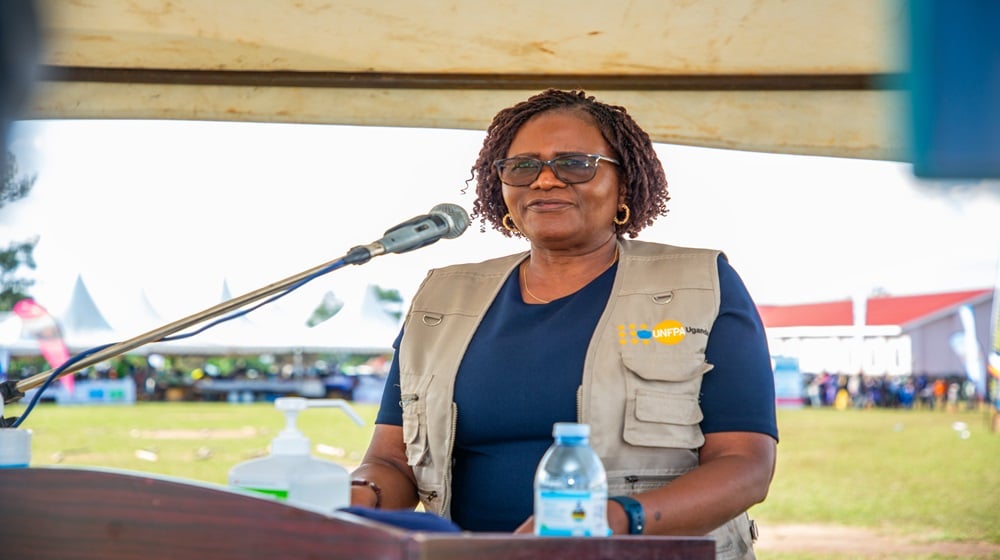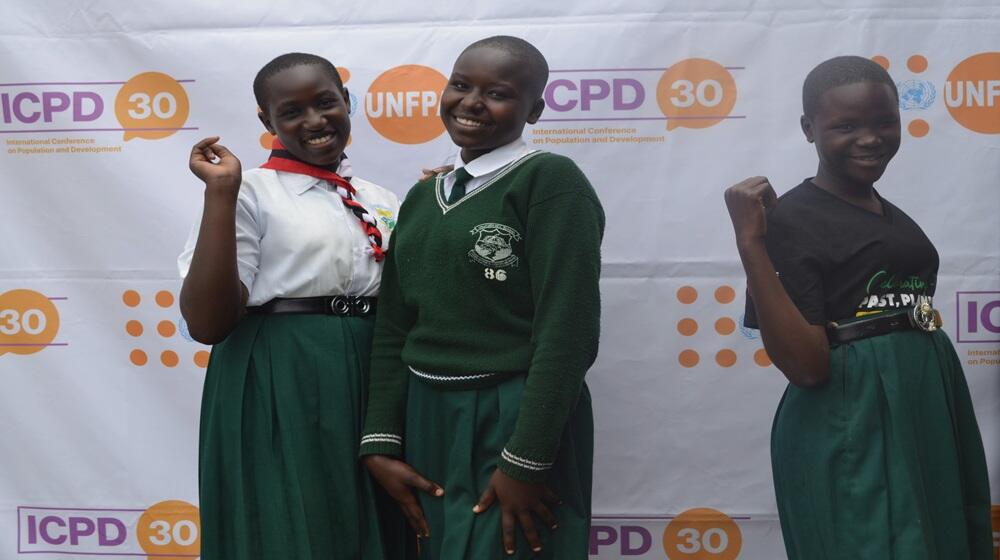ARUA, Westnile: Sixteen-year-old Peruth Mayokiya is an ambitious girl. The student of Okufura Secondary School in Ajono Parish, Vurra Subcounty, Arua District has a big dream. “In the future I want to be a dentist and what I have learnt from the film is that I can achieve that future by avoiding pregnancy, concentrating on my studies and obeying my parents,” she said.
Her peer, fourteen-year-old Aiyokuru Sharon from St. Augustine Secondary School also in Arua district said her dream is to be an academician. Both girls were in consensus that the way to achieving their dreams is by preventing teenage pregnancy, staying in school and listening to the advice and guidance of their parents.
Peruth and Sharon were among some of the many young people who attended the World Population Day celebrations in Arua City on July 11. Together, they had just concluded watching a short informative video on preventing teenage pregnancy, shown on one of the screens in an interactive exhibition space organized by UNFPA. The space targeted young people who were eager to learn about UNFPA and its mandate. The space also provided an opportunity for the young people to access adolescent reproductive health information to enable them make healthy choices.
In the West Nile region, the rate of teenage pregnancies stands at 37 percent, way higher than the national average of 24 percent. Socio-cultural factors attributed to this prevalence include poverty, cultural beliefs and practices, sexual violence, school drop out rates and limited access to sexual and reproductive health information and services, reports show.
This year’s World Population Day was significant because it coincided with the anniversary of the International Conference on Population and Development (ICPD) in Cairo where leaders from 179 countries committed to place sexual reproductive and health rights at the center of development. The ICPD Programme of Action aims to ensure universal access to reproductive health services, education and empowerment. Addressing teenage pregnancy is therefore crucial to achieving these goals and promoting sustainable development.
The global theme of this year’s World Population Day: “Embracing the power of inclusive data towards a resilient and equitable future for all” and the national theme: “Celebrating the past, planning for the future: towards meeting the needs of All” were particularly relevant.

In her remarks, UNFPA Uganda Representative Ms Gift Malunga commended the Ugandan government for showcasing its commitment to data-driven decision-making and evidence-based planning and prioritizing data-driven policies and programs, given the recent release of the 2022 UDHS and 2024 preliminary Census results which highlight the importance of data in promoting equitable and sustainable progress.
However, she noted, while data drives advancements, it also reveals gaps and inequalities due to gender, disability, socio-economic status, and geographical location.
“These disparities are evident in high teenage pregnancy rates, leading to school dropouts and perpetuating a cycle of poverty for many young girls. Addressing these issues requires urgent attention to ensure equal opportunities in education, employment, and paid labor,” Ms Malunga said.
ICPD30 football tournament
To mark World Population Day, UNFPA and partners organised a series of pre-event activities aimed at addressing the key challenge of teenage pregnancy and child marriage in the region. In collaboration with the Arua District Local Government, a football tournament was organized between four sub counties, providing an opportunity to reach out to communities on messages of ending child marriages and preventing teenage pregnancies. The football match was aligned to the message “Our Common future” in commemoration of the 30th anniversary of the ICPD. And for the leadership and communities in Arua, the message was envisioning a common future free of teenage pregnancy and child marriage.
While officiating at kick-off of the tornament, Arua District Chairman Mr. Alfred Okuonzi said teenage pregnancy and child marriage in the West Nile region remains alarming and more effort is needed by all stakeholders to address the vice, adding that social activities like sport has the potential to reach out to hard-to-access and other vulnerable groups such as out-of-school and adolescent girls.
“Each ball you kick is a kick out of teenage pregnancy and child marriage in our region. These are dream killers and we must close the taps of teenage pregnancy and child marriage in this region,” said LCV Chairman Alfred Okounzi at the launch of the tornament.
During the pre -WPD intergenerational dialogue organized by National Population Council, Mr. Okuonzi said teenage pregnancy remains one of the greatest hindrances to economic growth calling for deliberate interventions to address teenage pregnancy and its impacts so as to invest in human capital development as stipulated in the National Development Plan and Uganda’s Vision 2040. This, he said, would promote a more educated, productive and prosperous nation.
“A country that invests in its human capital development is a country that will secure its nation’s future. And how do we invest in human capital development? First of all we invest by making sure that pregnancy is by choice. All must be able to decide when to have a child and when to stop having children,” Mr. Okuonzi said.
An earlier meeting organized by Arua District Local Government, leaders agreed that teenage pregnancy was a hindrance to the socio-economic development of the region because it leads to early school dropouts thus hinders education attainment and opportunities for girls, is associated with health risks thus undermines child and maternal health, perpetuates a cycle of poverty, and reinforces gender inequality and limits girls empowerment. Leaders and communities also agreed that teenage pregnancy is a violation of young people’s reproductive rights as it often results from limited access to reproductive health information and services.
In a World Population Day message, Uganda’s President H. E. Yoweri Kaguta Museveni expressed concern about teenage pregnancies which he said had stagnated at 24 percent for decades. He said embracing poverty eradication programmes and keeping girls in schools are key strategies in ending teenage pregnancies and child marriages.
“Why marry young girls who should be in school? We shall not allow this to continue because child marriage is a significant barrier to girls’ education. I call upon all Ugandans to reject tendencies that promote child marriages, teenage pregnancy, gender based violence, drug abuse and school drop out,” the President said.
He added that community leaders should sensitize parents to send and keep their children in school and take advantage of government poverty eradication programmes like the Parish Development Model to improve livelihoods.
Written by Evelyn Matsamura Kiapi


